人教版七年级下册英语Unit12知识点
人教版七年级下册英语期末复习:Unit 7-Unit 12 各单元语法知识点复习提纲(全面!)
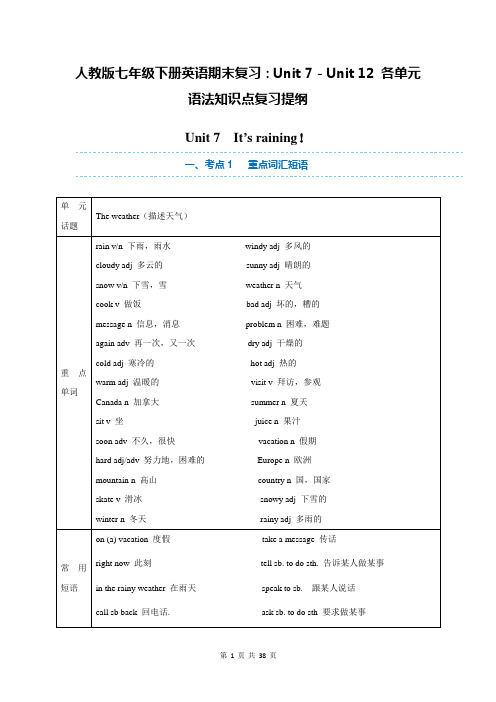
人教版七年级下册英语期末复习:Unit 7-Unit 12 各单元语法知识点复习提纲Unit 7 It’s raining!一、考点1 重点词汇短语1 messagemessage为可数名词,意为“消息,信息”,take a message for sb.“为某人捎个口信”。
拓展:give sb. a message 捎信给某人,leave a message 留口信,get the message 明白对方的意思。
Can I take a message for him?当某人发现要找的人不在或接电话的人发现打电话者要找的人不在时,常用此语2 could 情态动词意为“能,可以“,表示请求许可,在语气上比can委婉客气,但这种句式的肯定回答用can。
Could you just tell him to call me back?3 call及物动词,意为“打电话给”。
call sb. (up) “打电话给某人”,call sb. at +电话号码,意为“拨打……找某人”。
拓展:call 是一个多义词,call sb 可表示“叫醒某人,呼唤某人”;give sb. a call 给某人打电话。
4 back副词“回来,回原处,向后”;call sb. back给某人回个电话。
【即学即练】I’ll _____you _____.我将给你回电话。
5 visit此处用作及物动词,意为“拜访,探望”,后接表示人的名词或代词。
visit还可意为“参观,游览”,后接表示地点的名词。
拓展:visit还可用作可数名词,意为“访问,参观,拜访。
be on a visit to ... “正在访问/参观……”。
visitor参观者,游览者,游客。
I’m having a great time visiting my aunt in Canada._____ my grandparents every year at Christmas.我每年圣诞节都去探望我的祖父母。
人教版七年级英语下册单元知识归纳Unit12.doc
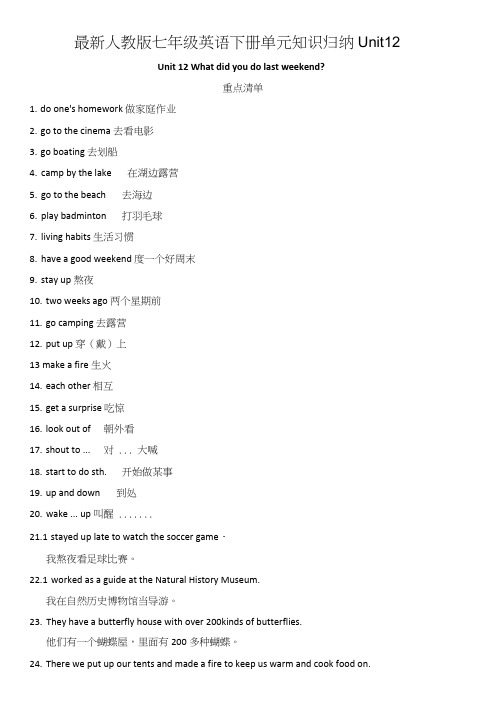
最新人教版七年级英语下册单元知识归纳Unit12Unit 12 What did you do last weekend?重点清单1.do one's homework 做家庭作业2.go to the cinema 去看电影3.go boating 去划船4.camp by the lake 在湖边露营5.go to the beach 去海边6.play badminton 打羽毛球7.living habits 生活习惯8.have a good weekend 度一个好周末9.stay up 熬夜10.two weeks ago 两个星期前11.go camping 去露营12.put up 穿(戴)上13 make a fire 生火14.each other 相互15.get a surprise 吃惊16.look out of 朝外看17.shout to ... 对 ... 大喊18.start to do sth. 开始做某事19.up and down 到处20.wake ... up 叫醒 .......21.1stayed up late to watch the soccer game・我熬夜看足球比赛。
22.1worked as a guide at the Natural History Museum.我在自然历史博物馆当导游。
23.They have a butterfly house with over 200kinds of butterflies.他们有一个蝴蝶屋,里面有200多种蝴蝶。
24.There we put up our tents and made a fire to keep us warm and cook food on.在那我们支起一个帐篷,并生火取暖,在火上烹饪食物。
25.1was so tired that I went to sleep early.我太累了,因此很早就去睡觉了。
人教版 英语 七年级下册 12单元知识点笔记

Unit121.Who visited her grandma?-----Becky did. (助动词did,代替前文的动词visited her grandma。
)动词的替代常用助动词:do, does, did 例:Who likes English?-----Kevin does.2.How interesting! 多么有趣啊!感叹句句式:How+ 形容词/副词(+主语+谓语)!How handsome (he is)!What+ 名词(+主语+谓语)!What a handsome teacher (he is)!3. a second language = another language 另一门语言不定冠词+序数词+可数名词单数表示另一个。
或又一个。
a third boy 又一个男孩定冠词+序数词+名词表示第。
个。
the third boy 第三个男孩4.so+形容词/ 副词that+ 句子如此。
以至于。
The boy is so young that he can’t go to school.5.surprised 和surprising 的区别:surprised修饰人,surprising 修饰物(tired, tiring, bored, boring, excited, exciting….用法类似)例: I am surprised the surprising news. 我对这个令人惊讶的消息感到惊讶。
to one’s surprise 令某人吃惊的是,in surprise吃惊地get a surprise 吃惊be surprised at….对…感到惊讶6.固定搭配:Shout at…. 对。
叫嚷(含指责,敌意)shout to….对。
大声喊(距离远,大声喊)Stay up late to do sth 熬夜做某事重点句型:1. That’s why it’s important to learn a second language.翻译:那就是为什么再学一门语言很重要。
人教版初中英语七年级下册Unit12SectionA教材全解

人教版初中英语七年级下册Unit12SectionA教材全解Unit 12 What did you do last weekend?Unit 12 Section A教材全解1.go boating去划船【重点注释】这是“go+doing”结构的短语,类似的还有:go swimming/fishing/shopping/skating/camping去游泳/钓鱼/购物/滑冰/野营。
2.camped by the lake在湖边野营【重点注释】①camp此处作不及物动词,意为“扎营,宿营”,常用短语go camping意为“去野营”,camp out意为“野营;露营”。
例如:We camped near the beach.我们靠近海滩宿营。
Where did you camp last night?昨晚你在哪里宿营了?They often go camping on summer holidays.他们经常在暑假去野营。
I went camping with my friends last Sunday.上星期日我和朋友们去露营了。
The students love camping out on summer holidays.学生们喜欢在暑假中露营。
【拓展记忆】camp还可作名词,意为“野营,营地“,可构成词组:summer camp夏令营,winter camp冬令营。
例句:Let’s go back to the camp.It’s getting dark.我们回营地吧。
天快黑了。
We had a good week at the camp.我们在营地过了愉快的一周。
Did you go to summer camp last year?去年你参加夏令营了吗?②by the lake在湖边,by此处是介词,意为“在……旁边”、“在……近旁”、“在……手边”,此时要注意它与介词near有所不同,即by表示的距离更“近”。
人教版七年级英语下册-Unit 12:知识点复习总结+单元测试(word版,无答案)

Unit12 What did you do last weekend?【重点单词】camp v.扎营;扎帐篷lake n.湖,湖泊beach n.海滩,沙滩badminton n.羽毛球运动sheep n.羊,绵羊as adv.&pron.作为,当做natural pron.自然的butterfly n.蝴蝶visitor n.游客;访问者tired adj.疲倦的stay v.停留stay up late深夜不留away adv.离开run away 跑开mouse n.老鼠baby n.幼小的shout v.呼叫,喊叫shout at…冲……大声叫嚷woof v.(狗叫声)汪汪language n.语言fiy v.飞kite n.风筝fiy a kite 放风筝high adj.&adv高的(地)high school中学ago adv.以前India n.印度tent n.帐篷put up 搭起,举起moon n.月亮surprise n.&v.惊奇,惊讶get a surpris 吃惊snake n.蛇scared adj.惊慌的move v.移动shout to… 对……大声喊叫start v.开始,着手jump v.跳跃up and down 上上下下wake v.弄醒,醒into prep.到……里面forest n.森林ear n.耳朵【重点短语】1. last weekend 上周末2. do one’s homework 做作业3. go to the cinema 看电影4. go boating 去划船5. camp by the lake 在湖边露营6. go to the beach 去海滩7. play badminton 打羽毛球8. on Saturday morning 在周六的早上9. study for the English test 为了英语考试学习10. feed some cows 喂一些奶牛11. work as a guide 做为一个导游工作12. Natural History Museum 自然历史博物馆13. butterfly house 蝴蝶馆14. over 200 kinds of butterflies 超过200多种蝴蝶15. tell sb about … 告诉某人关于…16. living habits 生活习惯17. be kind of tired 有点儿累19. stay up 熬夜20. play with sb. 和某人玩21. lose things 丢东西22. run away 跑开23. fly a kite 放风筝24.as a special gift 作为一个特殊的礼物25. take sb. to sp. 把某人带到某地26. go camping 去露营27. put up the tents 搭建帐篷28. make a fire 生火29. keep sb. warm 使某人保持温暖30. on the first night 在第一天晚上31.so...that... 如此…以至于…32. go to sleep 去睡觉33. get a surprise 吃惊34. see sb. doing sth. 看见某人正在做某事35. jump up and down 上蹦下跳36. climb onto one’s back 爬到某人背上37. shout at/shout to 大声喊叫38 wake …up 把...弄醒39. move into… 移入,爬进…中40. a useful lesson 有用的一课【重点句型】1.—What did you do last weekend?Lucy?Lucy,你上周末做了什么?—Well, on Saturday, I played badminton.噢.周六我打羽毛球了。
Unit12单词讲解人教版七年级英语下册
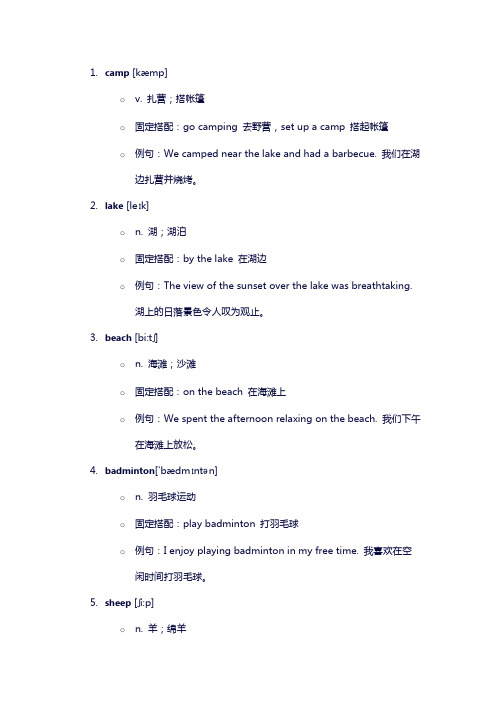
1.camp[kæmp]o v. 扎营;搭帐篷o固定搭配:go camping 去野营,set up a camp 搭起帐篷o例句:We camped near the lake and had a barbecue. 我们在湖边扎营并烧烤。
ke [leɪk]o n. 湖;湖泊o固定搭配:by the lake 在湖边o例句:The view of the sunset over the lake was breathtaking.湖上的日落景色令人叹为观止。
3.beach [bi:tʃ]o n. 海滩;沙滩o固定搭配:on the beach 在海滩上o例句:We spent the afternoon relaxing on the beach. 我们下午在海滩上放松。
4.badminton['bædmɪntən]o n. 羽毛球运动o固定搭配:play badminton 打羽毛球o例句:I enjoy playing badminton in my free time. 我喜欢在空闲时间打羽毛球。
5.sheep [ʃi:p]o n. 羊;绵羊o固定搭配:a flock of sheep 一群羊o例句:The farmer counts his sheep every night before going to bed. 农夫每晚睡前都数羊。
6.as[æz]o prep.&adv. 作为;当作o固定搭配:as a result 结果,as if 好像o例句:He behaved as if he were the boss. 他表现得好像他是老板。
7.natural['nætʃərəl]o adj. 自然的o固定搭配:natural resources 自然资源o例句:She has a natural talent for music. 她有音乐天赋。
人教版英语七年级下Unit12单词、知识梳理、词汇句式精讲
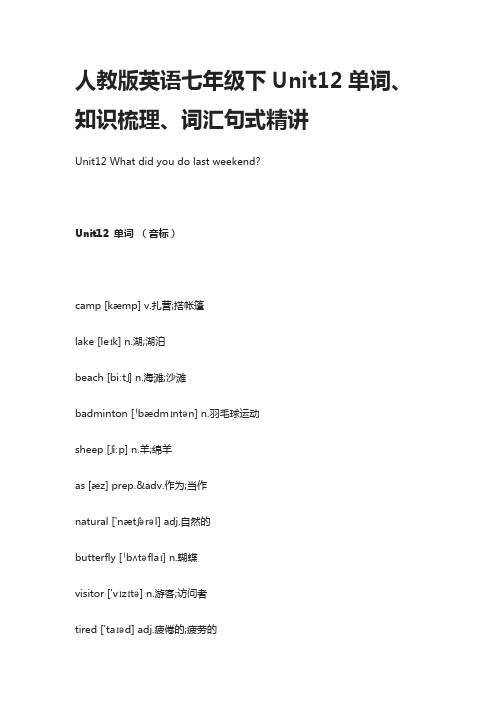
人教版英语七年级下Unit12单词、知识梳理、词汇句式精讲Unit12 What did you do last weekend?Unit12 单词(音标)camp [kæmp] v.扎营;搭帐篷lake [leɪk] n.湖;湖泊beach [biːtʃ] n.海滩;沙滩badminton [ˈbædmɪntən] n.羽毛球运动sheep [ʃiːp] n.羊;绵羊as [æz] prep.&adv.作为;当作natural ['nætʃərəl] adj.自然的butterfly [ˈbʌtəflaɪ] n.蝴蝶visitor ['vɪzɪtə] n.游客;访问者tired ['taɪəd] adj.疲倦的;疲劳的stay [steɪ] v.停留;待stay up late 深夜不留睡;熬夜away [ə'weɪ] adv.离开;远离run away ['rʌnəˌweɪ] 跑开mouse (pl. mice) 老鼠;耗子baby ['beɪbi] adj.&n.幼小的;婴儿shout [ʃaʊt] v.呼叫;喊叫shout at…冲……大声叫嚷woof int.(狗叫声)汪汪language ['læŋgwɪdʒ] n.语言fly (flew) v.飞kite [kaɪt] n.风筝fiy a kite 放风筝high [haɪ] adj.&adv.高的(地) high school 中学ago [ə'gəʊ] adv.以前India ['ɪndɪə] n.印度tent [tent] n.帐篷put up ['pʊtʌp] 搭起;举起moon [muːn] n.月亮surprise [sə'praɪz] n.&v.惊奇;惊讶;使吃惊get a surprise 吃惊snake [sneɪk] n.蛇scared [ /skeəd] adj.惊慌的;吓坏了的move [muːv] v.移动shout to…对……大声喊叫start [stɑːt] v.开始;着手jump [dʒʌmp] v.跳;跃up and down 上上下下;起伏wake (woke) v.弄醒;醒wake…up 把……弄醒into ['ɪntuː] prep.到……里面;进入forest [ˈfɒrɪst] n.森林ear [ɪə] n.耳朵Unit12 知识梳理【重点短语】1. last weekend 上周末2. do one’s homework 做作业3. go to the cinema 看电影4. go boating 去划船5. camp by the lake 在湖边露营6. go to the beach 去海滩7. play badminton 打羽毛球8. on Saturday morning 在周六的早上9. study for the English test 为了英语考试学习10. feed some cows 喂一些奶牛11. work as a guide 做为一个导游工作12. Natural History Museum 自然历史博物馆13. butterfly house 蝴蝶馆14. over 200 kinds ofbutterflies 超过200多种蝴蝶15. tell sb about …告诉某人关于…16. living habits 生活习惯17. be kind of tired 有点儿累19. stay up 熬夜20. play with sb. 和某人玩21. lose things 丢东西22. run away 跑开23. fly a kite 放风筝24.as a special gift 作为一个特殊的礼物25. take sb. to sp. 把某人带到某地26. go camping 去露营27. put up the tents 搭建帐篷28. make a fire 生火29. keep sb. warm 使某人保持温暖30. on the first night 在第一天晚上31.so...that... 如此…以至于…32. go to sleep 去睡觉33. get a surprise 吃惊34. see sb. doing sth. 看见某人正在做某事35. jump up and down 上蹦下跳36. climb onto one’s back 爬到某人背上37. shout at/shout to 大声喊叫38 wake …up 把...弄醒39. move into…移入,爬进…中40. a useful lesson 有用的一课【重点句型】1.---What did you do last weekend?你上周末做了什么?---Well, on Saturday, I played badminton.噢.周六我打羽毛球了。
人教版七年级下册英语Unit12知识点
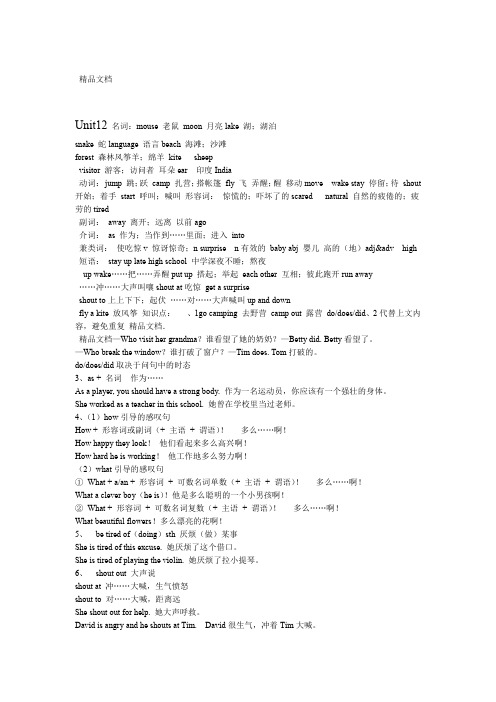
精品文档Unit12名词:mouse 老鼠moon 月亮lake 湖;湖泊snake 蛇language 语言beach 海滩;沙滩forest 森林风筝羊;绵羊kite sheepvisitor 游客;访问者耳朵ear 印度India动词:jump 跳;跃camp 扎营;搭帐篷fly 飞弄醒;醒移动move wake stay 停留;待shout 开始;着手start 呼叫;喊叫形容词:惊慌的;吓坏了的scared natural 自然的疲倦的;疲劳的tired副词:away 离开;远离以前ago介词:as 作为;当作到……里面;进入into兼类词:使吃惊v 惊讶惊奇;n surprise n有效的baby abj 婴儿高的(地)adj&adv high 短语:stay up late high school 中学深夜不睡;熬夜up wake……把……弄醒put up 搭起;举起each other 互相;彼此跑开run away ……冲……大声叫嚷shout at吃惊get a surpriseshout to上上下下;起伏……对……大声喊叫up and downfly a kite 放风筝知识点:、1go camping 去野营camp out 露营do/does/did、2代替上文内容,避免重复精品文档.精品文档—Who visit her grandma?谁看望了她的奶奶?—Betty did. Betty看望了。
—Who break the window?谁打破了窗户?—Tim does. Tom打破的。
do/does/did取决于问句中的时态3、as + 名词作为……As a player, you should have a strong body. 作为一名运动员,你应该有一个强壮的身体。
She worked as a teacher in this school. 她曾在学校里当过老师。
人教版七年级下册英语Unit12单元语法知识点总结

人教版七年级下册英语Unit12单元语法知识点总结本单元重点短语的具体用法1. Last weekend:用于描述过去的时间,通常在句子中作时间状语。
例如:I went shopping last weekend.(我上周末去购物了。
)2. Do one's homework:表示做作业。
例如:I need to do my homework before going out.(我需要在出去之前做作业。
)3. Go to the cinema:去看电影。
例如:They decided to go to the cinema instead of staying at home.(他们决定去电影院而不是待在家里。
)4. Go boating:去划船。
例如:We went boating on the lake and had a great time.(我们在湖上划船,玩得很开心。
)5. Camp by the lake:在湖边露营。
例如:They camped by the lake and enjoyed the beautiful scenery.(他们在湖边露营,欣赏美丽的风景。
)6. Go to the beach:去海滩。
例如:I like to go to the beach to relax.(我喜欢去海滩放松。
)7. Play badminton:打羽毛球。
例如:They played badminton in the park.(他们在公园里打羽毛球。
)8. On Saturday morning:在周六的早上。
例如:On Saturday morning, I usually sleep in.(在周六的早上,我通常会睡懒觉。
)9. Study for the English test:为英语考试学习。
例如:I have to study for the English test tomorrow.(我必须为明天的英语考试学习。
人教版七年级下册英语Unit12What-did-you-do-last-weekend?知识点总结

七下Unit 12 What did you do last weekend?一、Important Phrases:1.go to the cinema 去影院★=go to the movies2.go boating/camping 去划船/野营★summer camp 夏令营3.camp by the lake 在湖边野营★by the pool在池边4.go to the beach 去海滩★on the beach 在沙滩上5.play badminton 打羽毛球play+球类/棋类名词(不加冠词)6. study for the test 备考★test=exam7.feed some sheep/cows喂羊/牛★feed(fed)on...以..为食,feed with...用...喂养8. work as a guide 做导游工作★work as +职业从事某工作9. at the Natural History Museum 自然历史博物馆★nature(n.不可数)大自然-natural(adj.)自然的10. over 200 kinds of butterflies 200多种蝴蝶★over=more than 超过11.living habits 生活习惯★make a living 谋生;eating habits饮食习惯12.kind of tired 有点累★kind of = a little13. stay up late 熬夜★stay at home 待在家,stay away from 远离,lately(adv.)最近地14.sleep early 早睡★sleepy 困的,asleep睡着的15.a family of mice 老鼠一家★mouse(单)-mice(复)16.be afraid of sth./to do 害怕★afraid=scared17.run away 跑开★take away 带走,put...away 把某物收拾好,give away 捐赠18. climb onto one’s back 爬上某人的背19. shout at/to sb.冲某人大叫★shout out 大喊出20. a second language 第二语言★mother tongue 母语21.fly a kite放风筝22.do something interesting 做有趣的事★修饰不定代词,adj.后置:anything special23.finish high school 中学毕业★finish doing sth 完成做某事24.a special gift一特殊礼物★gift=present25.take us to India 带我们去印度26.take a long bus ride 坐很久的公交车27.put up our tents 搭帐篷★put up:搭建,举起,张贴28.make a fire生火29.cook food on the fire 在火上做饭★on an open fire 明火,篝火30.tell cach other stories 互相讲故事★tell a lie 说谎,tell a joke 讲笑话31.keep sb.warm 使某人保持暖和32.sit under the moon 坐在月光下★moonlight月光,moon cake月饼33.so.......that.......如此...以致于...34.get a surprise 吃惊35. look out of...向外看★look out 小心,look for寻找,look after 照顾36. jump up and down 跳上跳下37. move into the forest 进入森林38. wake sb up叫醒某人★wake up醒来,awake醒着的39. read a book about history 读一本历史书★read...to sb给某人读...40.see an interesting talk show 看有趣的脱口秀二、Key Language Points:1.Where did you go last weekend? What did you do last weekend?上周末你去了哪里?上周末你做了什么?一般过去时的特殊疑问句:1)特殊疑问词+did+主语+v.(原)+其他?如疑问词作主语,则陈述语序,如:Who bought you this new dress?谁给你买的新裙子?2)特殊疑问词+was/were+主语+其他?Where were you last night?昨晚你在哪里?2.----Who visited her grandma? -----Becky did.为避免重复,常用do,does,did,so等代替前文提到的内容。
七年级下册Unit 12 人教版英语中考一轮复习(词汇+语法讲解)

一轮复习:七下U12 词汇+语法讲解【单词默写】【单词变形】【单词变性】natural形容词变名词____________ scared形容词变动词____________ high形容词变名词____________ india名词变形容词____________visitor名词变动词____________move动词变形容词____________surprise动词变形容词____________【一词多义】1. as ____________ ______________ ___________ __________ ________________ As a student, study plays an important part.You should come here as soon as possible.As China develops, our life becomes better and better.As I came here, I met a friend of mine.I like many fruits such as apples, pears and so on.2. move __________ ___________ ______________We will move to a new house next week.The movie moved us very much.Could you move that box away?3. stay ___________ ___________ __________I will stay in a hotel when I travel to a new place.You should stay where you were.He keeps exercising every day, so he stays healthy.4. surprise _______________ _____________It’s a big surprise that he passed the exam.His behavior surprises me very much.【词汇用法】1. tired: adj./be tired/be tired of2. shout: v./shout to/shout at3. start: v./start to do/start doing/to start with/start out4. wake: v./wake sb. up/wake up【攻占语法】复习情态动词(can/could/would), 句型(祈使句/there be),副词(频度副词),形容词(原级),时态(一般现在时/现在进行时/一般现在时与现在进行时区别/一般过去时),介词(方式介词)【词汇练习】1.She works a ________ a nurse in that hospital.2.The e-book readers make it possible for students to throw a ________ heavy school bags.3.Let’s go c ________ on the beach tomorrow. My father got me a tent for my birthday.4.In parents’ eyes, teenagers are not expected to get their e ________ pierced. It looks awful.5.The boy, with his brother, f _______ the birdlike kite high in the sky last Sunday.6.The new term is coming. How time f ________!7.The h ________ you climb the mountain, the more beautiful view you will see.8.The government spoke h ________ of him for his courage and encouraged the public to learn from him.9.Please turn the direct speech i ________ the indirect speech.10.I was really scared when I saw a monkey j ________ towards me.11.Lucy has a gift in learning l________. She can speak both English and French.12.There were several m ________ in the house. So he decided to keep a cat.13.Today is Mid-autumn festival. Look! The m ________ is so bright and beautiful!14.Snakes don’t have ears, so they can’t hear but can feel things m ________.15.For her, books were as n ________ to life as bread.16.He saw an old man lying on the side of the road, s ________ for help.17.S ________ are a kind of animal that have no legs but can move quickly.18.Before the Spring Festival, it’s a tradition for Chinese people to clean their house and they hope to s ________away the bad luck.19.To his s ________, he successfully passed TOEFL (test of English as a foreign language).20.John felt really t ________ after working in the field for more than ten hours.21.I worked from early morning till late at night. It has been a long and t ________ day. Now I really need to go tobed.22.As the owners of the Hangzhou, we warmly welcome all the v ________ from the world.23.Sleeping Beauty has just w ________ from deep sleep. Everyone feels happy for her.24.My mother w ________ me up ato'clock yesterday morning and told me it was time to get up.25.The baby was w ________ by the loud noise outside.【语法练习】Henry likes music best of all the subjects and he dreams of being a singer. But because 1 ________ his poor family, he dropped out of school(辍学) two years ago and now he works on a farm. Although his pay isn’t high, he spends much money on CDs and music show 2 ________(ticket).One day there was a music show in the park. 3 ________ Henry went there, all the tickets were sold out. He saw a pole(杆子) outside the park and then climbed up the pole to watch the show. Three minutes later, a man came and said 4 ________(serious), “It’s dangerous up there! Come down!”“Wait 5 ________ minute, please!” Henry said. Then that man 6 ________(hear) someone playing the piano beautifully. He asked, “Who is the 7 ________(perform)?”“Bob!”“Wonderful! He’s my friend.”“What does he do? Is he a zookeeper?” asked Henry.“No, he’s a reporter. What 8 ________(make) you so happy?”“Oh, he is playing the piano with a dog,” Henry said.“That dog is pretty smart. In fact, it’s the 9 ________(smart) dog that I’ve seen,” said the man.“What other things can it do?” asked Henry.“It can dance when Bob sings English songs.” said the man.“Ah? ” Henry couldn’t believe his ears. “Wow, it’s so great. Look, it is enjoying 10 ________(it).What’s the most important thing for athletes to win? Training hard? Having an excellent coach? Never giving up? Probably these are all very important, but according to a new book, the most important thing is getting enough sleep.This book is Sleep to Win! 1 ________(write) by Dr. James Maas and Haley Davis. In this book, you can find out how getting more sleep helped fifteen-year-old Sarah Hughes win 2 ________ Olympic gold medal. She said 3 ________ the biggest change she made in her training for the Olympics was getting more sleep. Sleep to Win! also gives examples of other professional athletes as well as student athletes becoming faster runners because 4 ________ getting more sleep. For example, after Amber Way, a high school student in Michigan, changed her sleeping time from seven to over nine hours each night, her running speed 5 ________(increase) a lot. She finally became the state champion after 6 ________(break) five school records.Dr. Haley Davis explained, “Why is sleeping so helpful? The reason is that teenagers whose bodies are still growing need 7 ________(get) about 9.25 hours of sleep each night. That’s about two hours more than most American teenagers are getting. Enough sleep helps the brain work 8________(proper). While teenagers are sleeping, 9 ________(they) brains are preparing for the next day. A good 10 ________(night) sleep can help them make decisions, be creative and active.”Can you sing or dance? Do you ride a unicycle(独轮车)? Do magic tricks? Drink a glass of milk in ten seconds? Recite 1 ________(poem) from memory? Well, you’ve got talent, my friend! And what 2 ________(good) time to show it off than at the school talent show!Middle school talent shows in the us happen every year. Whatever you’ re good at, have five minutes 3 ________(show) the world. It’s early in the school year and kids can become little celebrities(明星). The shy boy who spends his evenings 4 ________(practice) Spanish guitar will surprise his classmates with beautiful music. The sporty girl on the soccer team will wow(使惊叹) the crowd 5 ________ her sweet singing voice. Everyone 6 ________(have) a chance to shine.Almost anyone doing almost anything 7 ________ (allow) into a talent show. As long as your isn’t rude 8 ________illegal(不合法的), it’s a “go”.On the day of the show, all the students sit in the school gymnasium, ready to cheer for the many skills of their classmates.Many of today’s stars 9 ________(start) their careers in school talent shows---Madonna, Britney Spears and Justin Timberlake all showed their skills early in life. 10 ________ you’re not Justin Bieber, you can become a star in your own right at your middle school talent show.When September is coming, it means it’s time to go back to school! For Chinese students, most school starts 1 ________ the same day. Except for the first-year students, most of you know you will share summer 2 ________(story) with the same classmates from last year. But in US schools, students are getting ready for classes 3 ________(different).First of all, US schools don’t all start on the same day. 4 ________(class) begin at any time between August and September. Every school 5 ________(decide) when their class will begin. If summers are hot, then school will usually start a little 6 ________(late).Every year Chinese students usually see the same teachers and classmates, 7 ________ US students have some big changes(变化).In American high schools, teachers divide subjects into different levels(等级). Students can choose their favourite teachers and courses according to their abilities(能力) and interests. This means that every year students will go to different 8 ________(classroom) for each class. They will meet new classmates and teachers in each one.________ the first year students, the first day of school also means they finally get their own lockers(储物柜). Primary school students in the US have to share lockers with their classmates. But once students make it to junior high, they finally get their own. Then they will have a place 10 ________(put) bags and coats.【参考答案】natural形容词变名词nature scared形容词变动词scare high形容词变名词height India名词变形容词Indian visitor名词变动词visit move动词变形容词moving surprise动词变形容词surprising1. as 作为与... 一样随着当…时候举例As a student, study plays an important part.You should come here as soon as possible.As China develops, our life becomes better and better.As I came here, I met a friend of mine.I like many fruits such as apples, pears and so on.2. move 搬家使…感动搬We will move to a new house next week.The movie moved us very much.Could you move that box away?3. stay 待在待着保持I will stay in a hotel when I travel to a new place.You should stay where you were.He keeps exercising every day, so he stays healthy.4. surprise 惊喜使…吃惊It’s a big surprise that he passed the exam.His behavior surprises me very much.【词汇练习】as away camping ears flew flies higher hightly into jumping language mice moon moving nature shouting snakes stay surprise tired tiring visitors woken woke woken【语法练习】of tickets When seriously a heard performer makes smartest itself written an that of increased breaking to get properly their night’s poems better to show practicing in has is allowed or started Although on stories differently Classes decides later but classrooms for to put。
Unit12知识归纳人教版七年级英语下册
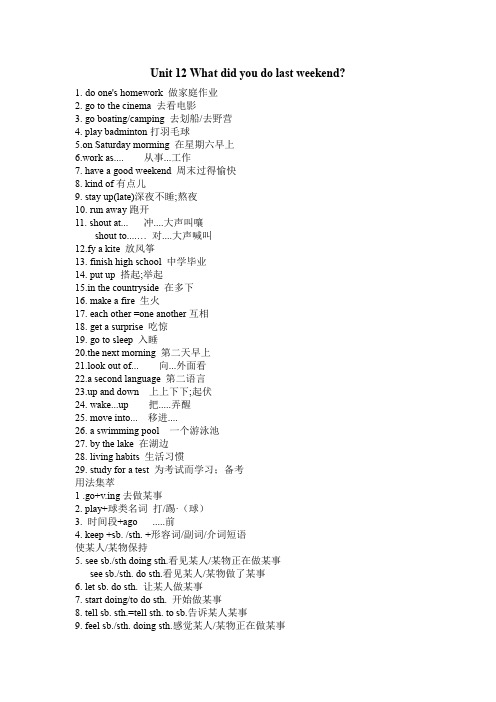
Unit 12 What did you do last weekend?1.do one's homework 做家庭作业2. go to the cinema 去看电影3. go boating/camping 去划船/去野营4. play badminton打羽毛球5.on Saturday morming 在星期六早上6.work as.... 从事...工作7. have a good weekend 周末过得愉快8. kind of有点儿9. stay up(late)深夜不睡;熬夜10. run away跑开11. shout at... 冲....大声叫嚷shout to....… 对....大声喊叫12.fy a kite 放风筝13. finish high school 中学毕业14. put up 搭起;举起15.in the countryside 在多下16. make a fire 生火17. each other =one another互相18. get a surprise 吃惊19. go to sleep 入睡20.the next morning 第二天早上21.look out of... 向...外面看22.a second language 第二语言23.up and down 上上下下;起伏24. wake...up 把.....弄醒25. move into... 移进....26. a swimming pool 一个游泳池27. by the lake 在湖边28. living habits 生活习惯29. study for a test 为考试而学习;备考用法集萃1 .go+v.ing去做某事2. play+球类名词打/踢·(球)3. 时间段+ago .....前4. keep +sb. /sth. +形容词/副词/介词短语使某人/某物保持5.see sb./sth doing sth.看见某人/某物正在做某事see sb./sth. do sth.看见某人/某物做了某事6. let sb. do sth. 让某人做某事7. start doing/to do sth. 开始做某事8. tell sb. sth.=tell sth. to sb.告诉某人某事9. feel sb./sth. doing sth.感觉某人/某物正在做某事feel sb./sth. do sth.感觉某人/某物做了某事10. so+形容词/副词+that.....如此......以至于......11.感叹句①How+ adj./adv.(+主语+谓语+其他)!① What(+ a/an)+ adj. +名词(+主语+谓语+其他)!作文范文:A Busy WeekendI had a busy weekend last week. I spent lots of time doing my homework on Saturday morning. Then I cooked lunch. After lunch, I went shopping and bought lots of food and drinks because it was my birthday the next day. In the evening, my parents and I went to the movies. On Sunday I got up early and cooked breakfast. I went for a picnic with my friends and enjoyed ourselves. In the afternoon, I went to the library and read some interesting books. I listened to some music and watched talk show on TV in the evening. Time passed quickly and I really had a busy but happy weekend.语法填空:1.I can feel the train (move) now.2.The old man (sit) here ten minutes ago.3.This was useful lesson for me.4.They went (camp) last weekend.5.There are a lot of (visit) in Beijing every year.6.They talked about their (live) habits.7.Some (mouse) were in the kitchen.8.(arrive) at school on time, you must get up early.9.There are many (sheep) on the farm.10.I was tired that I went to sleep early.11.You must learn how (call) the fire station.12.I satyed late to watch a soccer game.13. a beautiful girl she is!14.We camped the lake two days ago.15.I worked a guide at the history museum.16.Let me (help) you.17.We started (put) up tents.18.The snake moved the forest.19.Did you (finish) your homework last night?20.It is important (learn) a second language.。
2019-2020年人教版英语七年级下册Unit-12-What did you do last w

( )1.A. summer B. month C. weekday D. weekends( )2.A. a lot B. a lots of C. a lot of D. lot of( )3.A. zoo B. park C. bank D. library( )4.A. tigers B. people C. friends D. animals( )5.A. dangerous B. friendly C. interesting D. ugly( )6.A. houses B. buildings C. cages D. ponds(池塘)( )7.A. angry B. happy C. friendly D. boring( )8.A. looking B. seeing C. watching D. hearing( )9.A. in B. at C. with D. on( )10.A. friendly B. interesting C. warm D. coldⅥ.阅读理解(共15小题,每小题2分,共30分)AJim is an English boy. He comes to China with his father and mother.They comehere to work. Jim comes here to study. He is in No. 15 Middle School. He gets up early every day. He is never late for school. He studies hard.He can read and write English well. He often helps us with our English, and we often help him with his Chinese. After class, he li kes playing football, swimming,running, jumping and riding. He makes many friends here. We’re very glad tostay with him. On Sundays, he often helps his mother clean the house, mendsomething or do the shopping. He likes Chinese food very much.He likes living here. He likes the Chinese students very much. We all like him, too.阅读短文,判断正(T)误(F)。
初中英语人教版七年级下册Unit 12 知识点(重点单词+短语+句子精讲)

七年级英语下册Unit 12知识点【重点单词】camp v.扎营;扎帐篷lake n.湖,湖泊beach n.海滩,沙滩badminton n.羽毛球运动sheep n.羊,绵羊as adv.&pron.作为,当做natural pron.自然的butterfly n.蝴蝶visitor n.游客;访问者tired adj.疲倦的stay v.停留stay up late深夜不留away adv.离开run away 跑开mouse n.老鼠baby n.幼小的shout v.呼叫,喊叫shout at…冲……大声叫嚷woof v.(狗叫声)汪汪language n.语言fiy v.飞kite n.风筝fiy a kite 放风筝high adj.&adv高的(地)high school中学ago adv.以前India n.印度tent n.帐篷put up 搭起,举起moon n.月亮surprise n.&v.惊奇,惊讶get a surpris 吃惊snake n.蛇scared adj.惊慌的move v.移动shout to…对……大声喊叫start v.开始,着手jump v.跳跃up and down 上上下下wake v.弄醒,醒into prep.到……里面forest n.森林ear n.耳朵【重点短语】st weekend 上周末2.do one’s homework 做作业3.go to the cinema 看电影4.go boating 去划船5.camp by the lake 在湖边露营6.go to the beach 去海滩7.play badminton 打羽毛球8.on Saturday morning 在周六的早上9.study for the English test 为了英语考试学习10.feed some cows 喂一些奶牛11.work as a guide 做为一个导游工作12.Natural History Museum 自然历史博物馆13.butterfly house 蝴蝶馆14.over 200 kinds of butterflies 超过200多种蝴蝶15.tell sb about …告诉某人关于…16.living habits 生活习惯17.be kind of tired 有点儿累19.stay up 熬夜20.play with sb.和某人玩21.lose things 丢东西22.run away 跑开23.fly a kite 放风筝24.as a special gift 作为一个特殊的礼物25.take sb.to sp.把某人带到某地26.go camping 去露营27.put up the tents 搭建帐篷28.make a fire 生火29.keep sb.warm 使某人保持温暖30.on the first night 在第一天晚上31.so...that...如此…以至于…32.go to sleep 去睡觉33.get a surprise 吃惊34.see sb.doing sth.看见某人正在做某事35.jump up and down 上蹦下跳36.climb onto one’s back 爬到某人背上37.shout at/shout to 大声喊叫38 wake …up 把...弄醒39.move into…移入,爬进…中40.a useful lesson 有用的一课【重点句型】1.—What did you do last weekend?Lucy?Lucy,你上周末做了什么?—Well, on Saturday, I played badminton.噢.周六我打羽毛球了。
unit 12【复习课件】七年级英语下册单元复习(人教版)
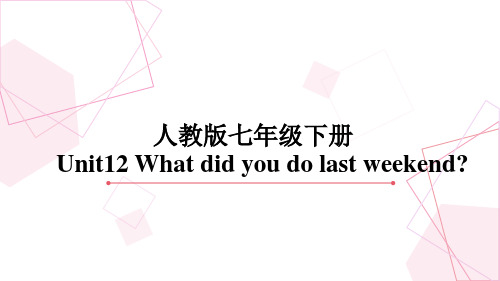
→ ___st_a_y_a_t__h_o_m_e____待在家里
重点单词
10. away adv. 离开; 远离→ ___b_e_a_w__a_y_f_r_o_m____远离 → ___go__a_w_a_y__走开
他还告诉我重要的是不要靠近蛇。
6. ..., _t_h_a_t’_s___ _w__h_y____ __it_’s_____ _im__p_o_r_ta_n_t_____ ___t_o____ _l_ea_r_n____ a second language.……
这就是为什么多学一门语言重要啦。
重点语法
重点句子
1. —_W__h_a_t_ ___d_i_d_ __y_o_u__ ___d_o__ last weekend, Lucy?
上周末你干什么了, 露西?
—Well, on Saturday morning, __I__p_l_a_y_e_d __b_a_d_m__in__to_n___.
噢, 在周六上午, 我打羽毛球了。
18. India n. 印度→ __I_n_d_i_a_n___印度人
19. surprise n. 惊奇; 惊讶 v. 使吃惊
→ __to__o_n_e_’s_s_u_r_p_r_i_se___令某人惊奇的是 → __su_r_p_r_i_s_in_g_adj. 令人惊奇的 → __su_r_p_r_i_s_ed__adj. 惊奇的 → __b_e_s_u_r_p_r_is_e_d_t_o__d_o_s_t_h_. _______做某事感到吃惊
人教版七年级下册英语 Unit 12 基础知识单词、短语、句子默写版

Unit 12 What did you do lastweekend?A部分重点单词★根据汉语提示默写出下列单词1.扎营;搭帐篷v.2.海滩;沙滩n.3.羊;绵羊n.4.自然的adj.5.游客;访问者n.6.停留;待v.7.老鼠;耗子n.8.呼叫;喊叫v.9.湖;湖泊n.10.羽毛球运动n.11.作为;当作prep. 12.蝴蝶n.13.疲倦的;疲劳的adj.14.离开;远离adv.15.幼小的adj. 婴儿n.16.语言n.★写出下列单词变形1.beach⎼______________(复数)2.butterfly⎼______________(复数)3.baby⎼______________(复数)4.tell⎼______________(过去式)5.two⎼______________(序数词)6.sheep⎼______________(复数)7.mouse⎼______________(复数)8.visit⎼______________(名词)游客9.lose⎼______________(过去式)重点短词★根据汉语提示默写出下列短语1.深夜不睡;熬夜2.冲……大声3.去划船4.某人的生活习惯5.作为一名导游6.告诉某人关于……7.度过一个愉快的周末8.跑开9.上周末10.湖畔扎营11.喂羊12.蝴蝶馆13.和某人一起去14.打羽毛球重点句子★根据汉语提示默写出下列句子1.—上个周末你做什么了?—我做我的家庭作业了。
2.—你好,Lisa, 周末过得怎么样?—好极了,谢谢。
3.—你周末过得愉快吗?—是的,愉快,但我现在有点累,我熬夜看足球赛了。
4.—她和谁一起去的?—她和她的同班同学一起去的。
5.我在自然历史博物馆当了一名导游。
6.它们(博物馆)有一座房子,里面有200多种蝴蝶!7.谁拜访她的祖母了?8.“所以嘛,儿子,那就是学会一门外语很重要的原因,”鼠爸爸回答道。
B部分重点单词★根据汉语提示默写出下列单词1.飞v.2.风筝n. 3.高的(地) adj.&adv.4.以前adv.5.蛇n.6.移动v.7.跳; 跃v.8.到……里面;进入prep.9.耳朵n.10.印度n.11.帐篷n.12.月亮n.13.惊奇;惊讶n. 使吃惊v.14.惊慌的; 吓坏了的adj.15.开始;着手v.16.弄醒;醒v.17.森林n.★写出下列单词变形1.scare⎼______________(形容词)2.up⎼______________(反义词)3.read⎼______________(过去式)4.wake⎼______________(过去式)5.start⎼______________(同义词)6.use⎼______________(形容词)7.fly⎼______________(过去式)8.sit⎼______________(过去式)重点短词★根据汉语提示默写出下列短语1.放风筝2.搭起;举起3.吃惊4.上上下下;起伏5.一件特殊的礼物6.搭起;举起7.在第一个夜晚8.入睡,睡着9.读关于…的书10.开始做某事11.搬进12.有趣的事情13.高中毕业14.打扫房间15.在周六晚上16.待在家里17.脱口秀18.中学19.互相;彼此20.对……大声喊叫21.把……弄醒22.乘长途车去23.使某人暖和24.讲故事25.朝外看26.知道关于27.跳上跳下28.生火29.觉得……正在做某事30.看见……正在做某事31.如此……以至于……32.和某人一起吃晚饭33.度过一个繁忙的周末34.为……学习重点句子★根据汉语提示默写出下列句子1.我的姐姐两周前高中毕业了。
人教版七年级下册英语Unit 12 知识点语法归纳总结
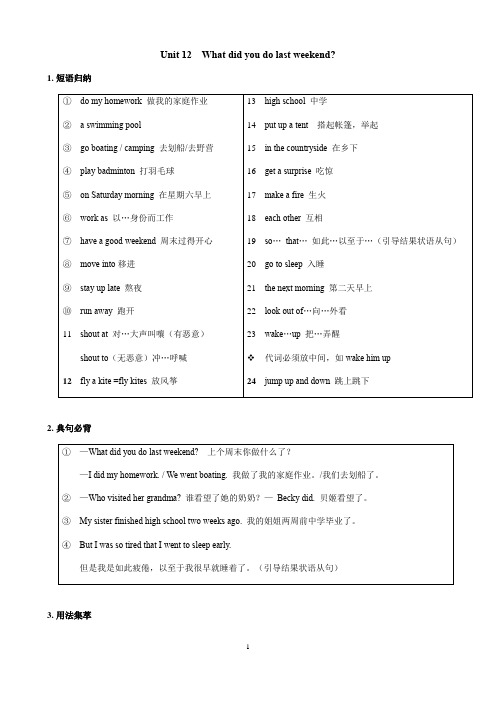
Unit 12 What did you do last weekend?1.短语归纳2.典句必背3.用法集萃(1)What did you do last weekend? 你上周末做了什么?❖last 作形容词时,意为“最后的,最末的”或者“紧接前面的,刚过去的”。
例如:Today is the last day in the year. 今天是今年的最后一天。
I didn’t sleep well last night. 昨晚我没睡好。
❖last作副词时,意为“最后地”,例如:I’m the last one. 我是最后一个。
❖last 做动词时,意思是“持续,继续,维持”等,例如:The hot weather lasted a week. 炎热的天气持续了一周。
(2)How interesting! 多有趣啊!❖本句是how引导的感叹句,how用来修饰形容词或副词,此类感叹句的结构为:“How+形容词/副词( +主语+谓语)!”。
例:How beautiful the girl is! 这个女孩真漂亮啊!How fast the boy is running ! 那个男孩跑得真快啊!❖what也可以引导感叹句,what用来修饰名词。
常见的结构有:(3)I stayed up late to watch the soccer game. 我熬夜到很晚看了足球赛。
❖stay up是固定搭配,意为“熬夜”。
例:She stayed up until 2 :00 am. 她熬夜熬到凌晨两点。
❖常见的“动词+up”结构的短语还有:(4)The cat quickly ran away. 那只猫飞快地逃跑了。
❖run away意为“逃跑;跑开”,其中run意为“跑”,过去式是ran,属于不规则变化。
例:The thief tried to run away, but he failed. 那个小偷试图逃跑,但失败了。
- 1、下载文档前请自行甄别文档内容的完整性,平台不提供额外的编辑、内容补充、找答案等附加服务。
- 2、"仅部分预览"的文档,不可在线预览部分如存在完整性等问题,可反馈申请退款(可完整预览的文档不适用该条件!)。
- 3、如文档侵犯您的权益,请联系客服反馈,我们会尽快为您处理(人工客服工作时间:9:00-18:30)。
Unit12 名词:
lake 湖;湖泊
beach 海滩;沙滩sheep 羊;绵羊
visitor 游客;访问者mouse 老鼠
language 语言
kite 风筝
India 印度
moon 月亮
snake 蛇
forest 森林
ear 耳朵
动词:
camp 扎营;搭帐篷stay 停留;待shout 呼叫;喊叫fly 飞
move 移动
start 开始;着手
jump 跳;跃
wake 弄醒;醒
形容词:
natural 自然的tired 疲倦的;疲劳的scared 惊慌的;吓坏了的副词:
away 离开;远离ago 以前
介词:
as 作为;当作into 到……里面;进入
兼类词:
baby abj有效的 n婴儿high adj&adv 高的(地)surprise n惊奇;惊讶 v使吃惊
短语:
stay up late 深夜不睡;熬夜wake……up 把……弄醒
run away 跑开
shout at……冲……大声叫嚷shout to……对……大声喊叫fly a kite 放风筝high school 中学
put up 搭起;举起
each other 互相;彼此
get a surprise 吃惊
up and down 上上下下;起伏
知识点:
1、 go camping 去野营
camp out 露营
2、do/does/did代替上文内容,避免重复
—Who visit her grandma?谁看望了她的奶奶?—Betty did. Betty看望了。
—Who break the window?谁打破了窗户?—Tim does. Tom打破的。
do/does/did取决于问句中的时态
3、as + 名词作为……
As a player, you should have a strong body. 作为一名运动员,你应该有一个强壮的身体。
She worked as a teacher in this school. 她曾在学校里当过老师。
4、(1)how引导的感叹句
How + 形容词或副词(+ 主语 + 谓语)!多么……啊!
How happy they look!他们看起来多么高兴啊!
How hard he is working!他工作地多么努力啊!
(2)what引导的感叹句
① What + a/an + 形容词 + 可数名词单数(+ 主语 + 谓语)!多么……啊!What a clever boy(he is)!他是多么聪明的一个小男孩啊!
② What + 形容词 + 可数名词复数(+ 主语 + 谓语)!多么……啊!
What beautiful flowers!多么漂亮的花啊!
5、 be tired of(doing)sth 厌烦(做)某事
She is tired of this excuse. 她厌烦了这个借口。
She is tired of playing the violin. 她厌烦了拉小提琴。
6、 shout out 大声说
shout at 冲……大喊,生气愤怒
shout to 对……大喊,距离远
She shout out for help. 她大声呼救。
David is angry and he shouts at Tim. David很生气,冲着Tim大喊。
Mary shouted to us to help her. Mary大声喊我们帮助她。
7、 to one's surprise 让某人惊讶的是
in surprise 惊奇地;惊讶地
get a surprise 吃惊
To my surprise, he didn't pass the exam. 让我惊讶的是,他没有通过考试。
They look at each other in surprise. 他们惊讶地看着对方。
I got a surprise when I saw the bill. 一看账单我吃了一惊。
8、 be scared of sth害怕某物
be scared to do sth 害怕做某事
I am scared of snakes. 我害怕蛇。
She is scared to climb the tree. 她害怕爬树。
9、move to + 地点搬到/移到某地
He wants to move to countryside. 他想搬到乡下。
10、 start/begin to do sth 开始做某事
to start with第一;首先 = first of all
She starts to clean the room at 8:00. 她在8点开始打扫房间。
To start with, you should open the door. 首先,你应该打开门。
11、一般过去时知识点见具体讲义
1.We went to the b and swam in the sea last summer.
2.Tom can speak three l . They are Chinese, English and French.
3.When I heard the news, I got a great s .
4.Tigers and monkeys like to live in the f .
5.The m and the sun both rise in the east and go down in the west.
6.The baby (wake)up and began to cry.
7.How many (sheep)can you see on the farm?
8.It is (nature)for parents to worry about their children.
9.The mountain is too . I think I can't climb it up.
10.Please your hands before you answer the teacher's question in class.
11. weather!It's raining!
12.It's not polite(礼貌的)to (大声喊)your parents.
13.Don't late, or you will feel tired next day.
14.Some girls (害怕老鼠).
15.Tom (跑开)quickly.
16.We (扎营)by the river last night.
17.—Who cleaned the room?—Peter .
18.(作为)a student, you should study hard.
19.I'm t after studying all day.
20.A kangaroo can (跳)high.
21.Don't (待)too long at the party.
22.He (开始)to write novel at the age of 20.
23.Tom is scared of (蛇).
24.The children are jumping (上上下下)in the room.。
